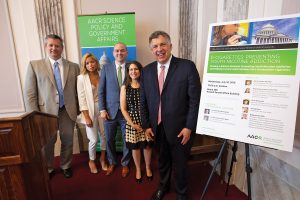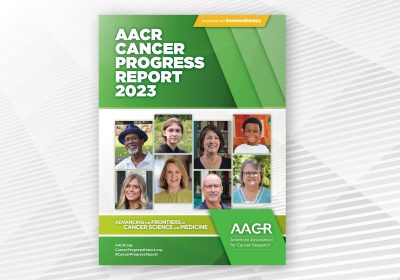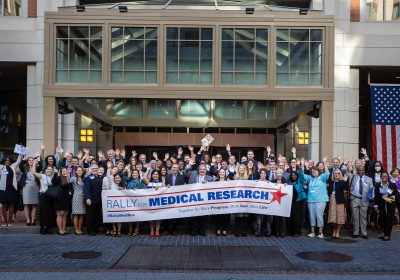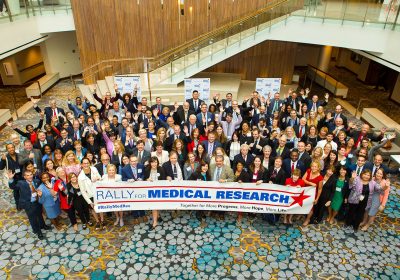The AACR Helps Shape Policy, Rallies for Federal Funding
Policymakers, government officials, and regulatory authorities turn to the American Association for Cancer Research (AACR) when they need a trusted resource on science and cancer policy issues.
The AACR’s Office of Science Policy and Government Affairs in Washington, D.C., provides evidence-based guidance on topics as wide-ranging as biomedical science funding, regulatory science innovation, tobacco control and cancer prevention, cancer health disparities, and cancer survivorship.

The AACR’s policy leadership role came to the fore during the Rally for Medical Research Hill Day held Sept. 13 in Washington, D.C. As the founding organizer of this annual initiative, the AACR brought together more than 325 organizations and institutions from all over the country for a day of meetings with elected representatives and their staff members on Capitol Hill. The Rally Hill Day allows researchers, physician-scientists, health care professionals, survivors, and other patient advocates to speak with one voice in support of funding for the National Institutes of Health (NIH).
“The most striking thing about the Rally Day is the breadth and scope of organizations and individuals that participate to make our collective voices heard,” said George D. Demetri, MD, director of the Ludwig Center at Harvard, associate director for clinical sciences at the Dana-Farber Cancer Institute in Boston and chair of the AACR Science Policy and Government Affairs Committee. “It’s extraordinarily powerful for policymakers to see everyone united with one message.”
The central focus of the AACR’s Washington office is to work with Congress to support cancer research by advocating for robust, sustained, and predictable annual budget increases for the NIH and the National Cancer Institute (NCI). The AACR also supports funding for the Food and Drug Administration (FDA), specifically the Oncology Center of Excellence. Another key goal is to encourage member scientists and patient advocates to communicate with lawmakers and educate Members of Congress and their staffs on timely topics in cancer research and public health.
As an example, the AACR organized a congressional briefing on e-cigarette usage trends and nicotine uptake prevention in middle- and high-school students. The briefing, co-sponsored by Illinois Senator Dick Durbin and Representative Jackie Speier of California, was held July 18 on Capitol Hill. Participants explored the challenge of preventing a new generation of youth from becoming addicted to nicotine, while considering the potential for e-cigarettes to serve as a less harmful alternative for current adult smokers.
“Sharp increases in the use of e-cigarettes, like Juul, among teens has alarmed parents, educators, and policymakers,” said Roy S. Herbst, MD, PhD, chief of medical oncology at Yale Cancer Center in New Haven, Connecticut, and chair of the AACR Tobacco and Cancer subcommittee. “Holding a briefing on Capitol Hill has allowed the AACR to inform Congressional staffers and the public on the latest evidence and begin a dialogue about the best ways to reduce youth use of these addictive products.”
The AACR also works to ensure that findings from cancer research are put into action. In 2018, the AACR Tobacco and Cancer Subcommittee provided comments on several proposed FDA tobacco-related initiatives, including innovation in nicotine replacement therapies; use of flavorings in tobacco products, including e-cigarettes; lower nicotine content in combustible cigarettes; and regulation of premium cigars.
In addition, the AACR works closely with the FDA Oncology Center of Excellence to ensure that the latest research-based evidence informs regulatory decisions on cancer diagnostics and treatments. The AACR and the FDA regularly collaborate on workshops that bring together stakeholders from cancer centers, the pharmaceutical industry, government agencies, and advocacy groups to highlight recent developments and explore solutions to regulatory science challenges.
The AACR also sponsors both a science policy track and a regulatory science policy track at the AACR Annual Meeting. This year’s sessions covered CAR-T personalized immunotherapy, biosimilars (products that are highly similar to currently approved FDA products), recently approved breakthrough therapies, real-world evidence, and much more.
“For drug development to be efficient, it is essential that researchers and regulators stay abreast of the latest advances in cancer research,” said Kenneth C. Anderson, MD, Kraft Family professor of medicine at Harvard Medical School in Boston and chair of the AACR Regulatory Science and Policy subcommittee. “The AACR works closely with the FDA to discuss and help inform regulatory science and policy, thereby promoting translation of cutting-edge science and providing access to novel therapies for patients and their families.”
Related Posts





